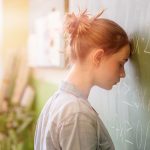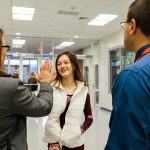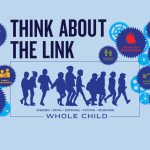“In my work as a researcher,” says LLEP doctoral candidate Pauline Batista ’16 MA, “I come from an understanding where youth do not have a voice unless youth have the educational skill set or the educational apparatus.”
“We have a lot to be worried about as adults, but at the center of what is going on in our heads should be how we are talking about back-to-school with our children,” says Sandra Chafouleas, Board of Trustees Distinguished Professor and school mental health expert.
Andrew Girard MA ’19 has been preparing for baseball’s opening day since this past September. As the stadium operations manager for the Hartford Yard Goats, Girard oversees the maintenance and facility enhancement projects at Dunkin’ Donuts Park in Hartford, Connecticut. When he learned that the season start date would be delayed due to COVID-19, he and his team began creating systems to ensure that fans would feel comfortable and safe when they were able to return to the park.
Schools play a critical role in fostering emotional safety for adults and students. In responding to COVID-19, schools planning to reopen must include efforts that define a safe school environment as having not only physical elements such as cleaning practices, ventilation conditions, and physical distancing protocols, but also emotional elements.
“To my surprise, the tweet went viral and led to my writing an op-ed in The New York Times entitled ‘I Refuse to Run a Coronavirus Home School.’ Since then, in addition to trying to keep my sanity, I have appeared on shows from ‘Good Morning America’ to ‘Central Time’ on Wisconsin Public Radio, spreading the message to parents that all we can do right now is our best and that’s enough,” says Jennie Weiner, an associate professor of educational leadership. “That we need to have self-compassion because it’s going to be messy, and to remember that educators, too, need our support and compassion as they attempt to be superhuman so we can feel a bit more human.”
In the wake of the pandemic, schools have pivoted to online learning. Rachael Gabriel, associate professor of literacy education and director of Neag School of Education’s Reading and Language Arts Center, knew she wanted to help the education community amid this major shift.
Polykosmia is a universe dreamed up by students in two classes led this spring by Stephen Slota (he/him, they/them), Neag School assistant professor-in-residence of educational technology. The project, an exercise in both worldbuilding and lesson planning, involved designing everything from mythologies to local governments to individual character arcs. Students also learned how to adapt worldbuilding activities into K–12 classrooms and how to design lesson plans that connected story objectives in a fictional world with learning objectives in the classroom.
The Neag Foundation has provided the UConn Collaboratory on School and Child Health (CSCH) with a two-year grant to facilitate work in the Think about the Link Project. The project builds from the CDC’s Whole School, Whole Community, Whole Child (WSCC) model to fully acknowledge the many interrelated components involved in supporting student well-being. The Think about the Link Project offers practical tools to help schools enhance their work by incorporating the WSCC model in decision-making across academic, social, emotional, behavioral, and physical supports.
Graduation, prom, banquets, trips. Our teenagers are lamenting so many lost milestones. My daughter, a high school senior, recently summed up her thoughts about graduating amid a pandemic: “It feels like the light at the end of the tunnel was just snuffed out.”
Each of us is processing what is happening in the world right now on our own terms. Some of us prefer to do this alone, reflecting inwardly. Initially, I was one of them. I avoided talking through my feelings with anyone else. I did not consider myself prepared to help other people feel better. I put on my figurative protective armor and took some time to try and catch my breath. I did this despite knowing that, given my position and my race, people might want to hear from me. Despite their needs, I had to take care of self, first.










